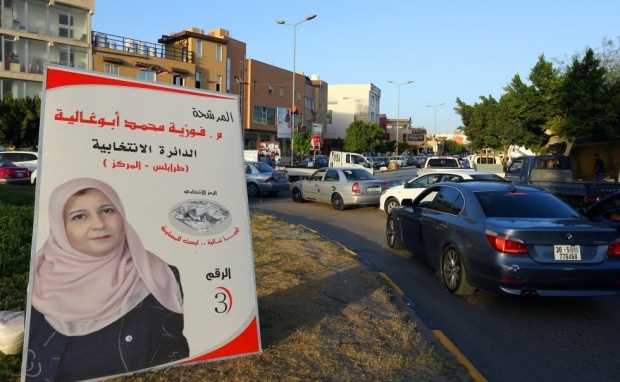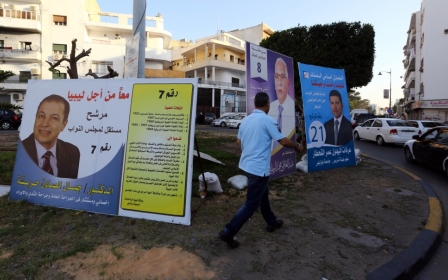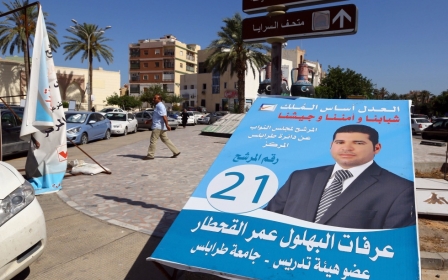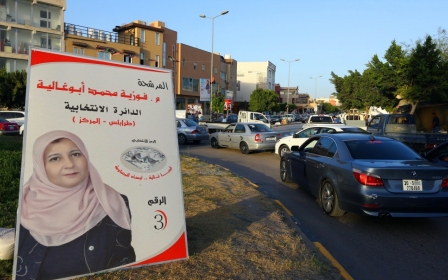Libyans dismay at the fruits of democracy

The United Nations was fighting Libyan voter apathy ahead of Wednesday's national elections with a TV commercial urging people to go out and vote.
Dismay at the fruits of democracy has seen voter registration plunge for the ballot for the 200-seat House of Representatives, the new national parliament.
Many have given up on the idea of democracy after dismay at gridlock and corruption in the outgoing general national congress, elected in a burst of optimism two years ago. Just 1.5 million have registered to vote for Wednesday’s elections, half the number who did so in 2012.
The big idea of the UN video, called Libya and produced by young filmmakers, is having three presenters, one from each of the three regions, urging fellow citizens to exercise their democratic rights.
“When we would watch promotions on TV they would all be in the same (Tripoli) accent,” said producer Ahmed Boudabous. “That is the thing that might make the viewer in the east or south feel excluded.”
The promotional film, released this week, urges Libyans to reconnect with the democratic ideal that powered its violent 2011 uprising against Muammar Gaddafi.
“Elections can offer solutions to the crises we are in,” said Boudabous.
The UN, like the government, hopes that the poll can indeed give Libya a legitimate parliament, if only to bring the country’s grievances inside its walls, rather than explode on the streets.
That is the reality at present. For more than a month, forces of former general Khalifa Haftar, allied to sections of the army and air force, has been fighting Islamist militias in Benghazi who he labels “terrorists” in battles that have left more than 200 dead.
The fighting, involving air strikes, has been bitter, turning much of the city into a war zone. More violence erupted over the weekend in the main southern city of Sebha, leaving eight dead, in the latest of a chain of tribal conflicts.
Publicly, election organizers insist all 1300 polling stations will be open but some officials acknowledge parts of the country may be too strife torn for voting to take place.
Aside from violence, voting may be boycotted in western districts by ethnic Amazigh and Tobu peoples in a protest against what they see as too little representation in the new parliament.
“We will have an election, we will have a parliament, even if some seats are not filled,” said one government official.
Whether a partial parliament is able to convince Libyans of its legitimacy is a question only time will answer.
Unlike the former congress, there are no seats reserved for political parties, themselves widely discredited among the public, but their absence may make coalition-building difficult.
Top of the parliament’s in-tray will be the fighting in Benghazi. Haftar, who enjoys widespread support from the armed forces, has promised an election-day ceasefire, but vowed to continue his campaign to purge the east of “terrorists.”
A close second will be ending an oil blockade by striking soldiers and militias that has paralyzed the bulk of Libya’s oil production, and with it the main source of government revenue. The combination of blockade and violence has also choked off foreign investment, leaving the economy in tatters.
Tripoli is in subdued mood ahead of the elections with few election posters on the street, in part because petrol shortages are keeping many at home. “Finding petrol is my priority, I have no time for anything else,” said Mohammed, a taxi driver.
Libya’s outgoing congress ended its two year tenure in acrimony, its nadir reached last month when the supreme court overturned its appointment of businessman Ahmed Miitig the third prime minister in as many months.
For the moment, caretaker prime minister Abdullah al-Thani, the former defence minister, remains at the helm, though at the head of a government hamstrung by a political polarization between Islamists and their tribal-based opponents.
The United Nations and European Union both called this week for calm, with the UN Security Council calling the election “an important step in Libya’s transition towards stable democratic governance”.
New MEE newsletter: Jerusalem Dispatch
Sign up to get the latest insights and analysis on Israel-Palestine, alongside Turkey Unpacked and other MEE newsletters
Middle East Eye delivers independent and unrivalled coverage and analysis of the Middle East, North Africa and beyond. To learn more about republishing this content and the associated fees, please fill out this form. More about MEE can be found here.




